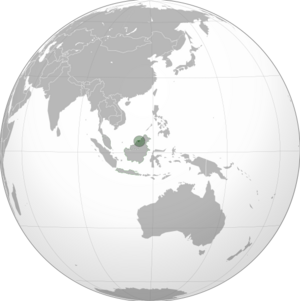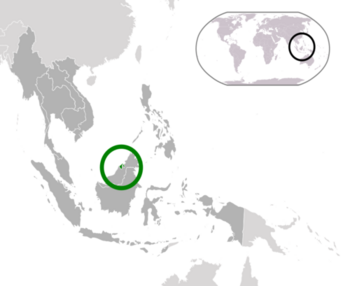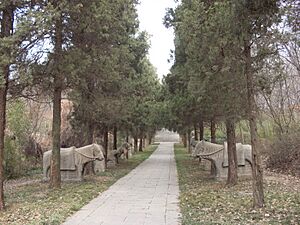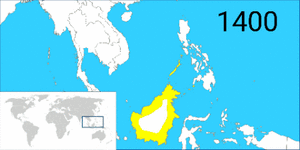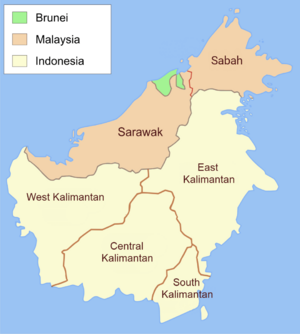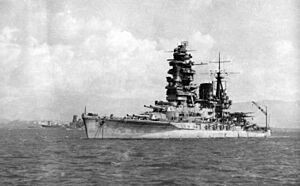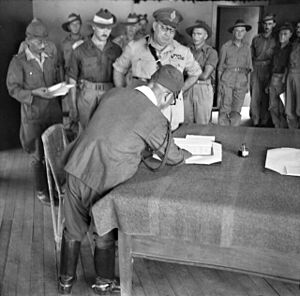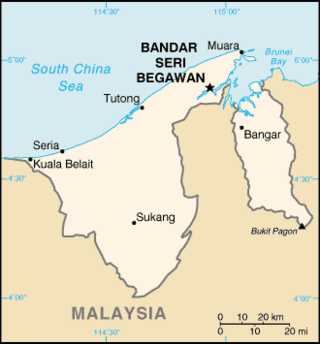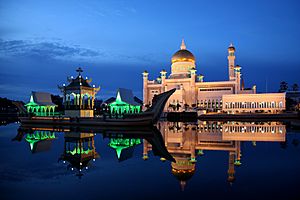Brunei facts for kids
Quick facts for kids
Brunei Darussalam
Negara Brunei Darussalam (Malay)
|
|
|---|---|
|
|
|
|
Motto:
|
|
|
Anthem:
|
|
| Capital and largest city
|
Bandar Seri Begawan 4°53.417′N 114°56.533′E / 4.890283°N 114.942217°E |
| Official language | Malay |
| Other languages and dialects |
|
| Official scripts |
|
| Ethnic groups
(2023)
|
|
| Religion
(2021)
|
|
| Demonym(s) | Bruneian |
| Government | Unitary Islamic absolute monarchy |
|
• Sultan and Prime Minister
|
Hassanal Bolkiah |
|
• Crown Prince and Senior Minister
|
Al-Muhtadee Billah |
| Legislature | none |
| Formation | |
| c. 1368 | |
| 17 September 1888 | |
|
• Independence from the United Kingdom
|
1 January 1984 |
| Area | |
|
• Total
|
5,765 km2 (2,226 sq mi) (164th) |
|
• Water (%)
|
8.6 |
| Population | |
|
• 2020 estimate
|
460,345 (169th) |
|
• 2016 census
|
417,256 |
|
• Density
|
72.11/km2 (186.8/sq mi) (134th) |
| GDP (PPP) | 2024 estimate |
|
• Total
|
|
|
• Per capita
|
|
| GDP (nominal) | 2024 estimate |
|
• Total
|
|
|
• Per capita
|
|
| HDI (2022) | very high · 55th |
| Currency | Brunei dollar (BND) |
| Time zone | UTC+8 (Brunei Standard Time) |
| Driving side | left |
| Calling code | +673 |
| ISO 3166 code | BN |
| Internet TLD | .bn |
|
|
Brunei (officially called the Nation of Brunei, the Abode of Peace) is a small country in Southeast Asia. It's located on the island of Borneo, surrounded mostly by Malaysia, with a coastline along the South China Sea. Its capital city is Bandar Seri Begawan. Brunei is quite small and doesn't have a very large population.
The country is led by the Sultan of Brunei, who is known for being very wealthy thanks to Brunei's oil resources. The official religion in Brunei is Islam. There are also smaller groups of people who follow Buddhism or Christianity. The main language spoken is Malay, and English is also widely used. Brunei is one of the smallest Muslim countries in the world.
Contents
Brunei's History
Early Beginnings
Long ago, the area that is now Brunei was part of a trading network called the Maritime Jade Road. This network was active for thousands of years, from 2000 BC to 1000 AD. An early settlement called Vijayapura was a small state connected to the Buddhist Srivijaya empire.
One of the first records of a kingdom in Borneo comes from a Chinese letter in 977 AD. It was sent to the Chinese emperor from the ruler of Boni, which many believe was Brunei. In 1225, a Chinese official reported that Boni had 100 warships to protect its trade. He also noted that the kingdom was very wealthy.
In the 1300s, Chinese records mentioned that Brunei controlled parts of what are now Sarawak and Sabah. It also had influence over some kingdoms in the Philippines.
A Javanese book from 1365, called Nagarakretagama, mentioned Brunei as a state that paid tribute to the Hindu Majapahit empire. However, in the 15th century, Brunei became independent from Majapahit. It also converted to Islam, becoming the independent Sultanate of Brunei.
War with Spain and Challenges
Brunei became very important in Southeast Asia when the Portuguese took over Malacca. Many wealthy Muslim traders moved to Brunei, making it stronger. The Sultan of Brunei then became involved in conflicts in the Philippines.
However, European influence slowly weakened Brunei's power. The country also faced internal problems over who should be the next ruler. In 1578, Spain declared war on Brunei. They planned to attack and capture Kota Batu, which was Brunei's capital at the time.
The Spanish captured the capital on April 16, 1578. The Sultan, Saiful Rijal, had to flee. But the Spanish soldiers faced a serious illness, possibly cholera or dysentery. Because of this, they decided to leave Brunei on June 26, 1578, after 72 days.
Local Bruneian stories about this war are a bit different. They describe it as a heroic event where the Spanish were driven out by a brave Bruneian leader. After this, Brunei went through a difficult period, including a civil war from 1660 to 1673.
British Influence

The British became involved in Brunei's affairs several times. In the 1880s, the Bruneian Empire continued to shrink. The Sultan gave land, which is now Sarawak, to James Brooke. Brooke had helped him stop a rebellion. Over time, Brooke and his family took more and more land from Brunei.
Sultan Hashim Jalilul Alam Aqamaddin asked the British for help to stop this. A "Treaty of Protection" was signed on September 17, 1888. This treaty meant that Brunei could not give away any land without British permission. It gave Britain control over Brunei's foreign affairs, making it a British protected state. This protection lasted until 1984.
However, when Sarawak took Brunei's Pandaruan District in 1890, the British did not stop it. This final annexation left Brunei with its current small size and two separate parts.
British advisors were introduced in Brunei in 1906. They were meant to advise the Sultan on how to run the country. Over time, these advisors gained more power than the Sultan. This system ended in 1959.
Oil Discovery
Oil was found in Brunei in 1929 after many attempts. People noticed the smell of oil near the Seria river in 1926. The first oil well, Seria Well Number One (S-1), was drilled on July 12, 1928. Oil was found on April 5, 1929.
The British Malayan Petroleum Company (now Brunei Shell Petroleum Company) was formed in 1922. The first oil well in the sea was drilled in 1957. Oil and natural gas have been the main source of Brunei's wealth and development since the late 20th century.
Japanese Occupation
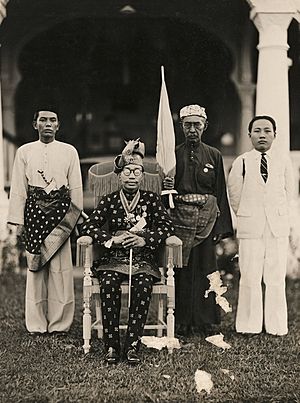
The Japanese invaded Brunei on December 16, 1941, during World War II. They landed 10,000 troops at Kuala Belait. After six days of fighting, they took over the entire country.
The Japanese made an agreement with Sultan Ahmad Tajuddin about governing Brunei. The Sultan kept his throne and was given a pension. Most of the Malay government officers also kept their jobs.
The British had expected a Japanese attack but didn't have enough resources to defend the area. Before the Japanese arrived, the oil wells in Seria were filled with concrete to prevent the Japanese from using them.
During the occupation, the Japanese taught their language in schools. The local money was replaced by "banana money," which lost all its value by the end of the war. Food and medicine became scarce, and people suffered from hunger and sickness.
The airport runway was built by the Japanese. In 1944, the Allies (the countries fighting against Japan) began bombing the Japanese. This destroyed much of Brunei town.
On June 10, 1945, the Australian 9th Division landed to take back Borneo from the Japanese. Brunei town was heavily bombed but was recaptured after three days. The Japanese forces in Brunei officially surrendered on September 10, 1945. The British Military Administration then took over until July 1946.
After World War II
After World War II, a new government was formed in Brunei. Its main job was to rebuild Brunei's economy, which was badly damaged by the Japanese. They also had to put out the fires on the oil wells in Seria.
In 1959, a new constitution was written. It said that Brunei would govern itself, but the United Kingdom would still be in charge of its foreign affairs, security, and defense. A small rebellion happened in 1962, but it was stopped with help from the UK. This rebellion influenced the Sultan's decision not to join the new country of Malaysia.
Brunei became fully independent from the United Kingdom on January 1, 1984. The country celebrates its independence day on February 23 each year.
Writing the Constitution
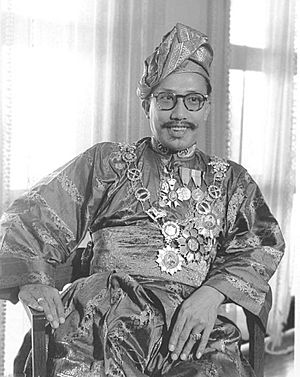
In 1953, Sultan Omar Ali Saifuddien III created a committee to ask citizens what they thought about having a written constitution. After discussions, they decided to draft a constitution. In March 1959, the Sultan went to London to talk about the proposed Constitution.
On September 29, 1959, the Constitution Agreement was signed in Brunei Town. This agreement made the Sultan the Supreme Head of State. It also stated that Brunei would handle its own internal matters. The British government would only be responsible for foreign and defense affairs. The role of the British Resident was replaced by a British High Commissioner.
Five councils were also created to help govern the country:
- The Executive Council
- The Legislative Council of Brunei
- The Privy Council
- The Council of Succession
- The State Religious Council
National Development Plans
Sultan Omar Ali Saifuddien III started a series of National Development Plans to improve Brunei.
The first plan began in 1953. A large amount of money was approved for it. Under this plan, a gas plant was built. Brunei Shell Petroleum also started exploring for more oil and gas. By 1956, oil production greatly increased.
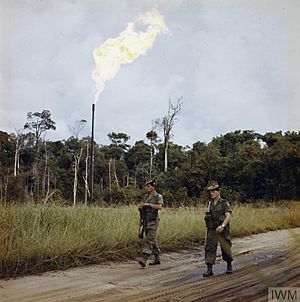
The plan also helped improve education and transportation. New roads were built, and the Berakas Airport was updated.
The second plan started in 1962. A major oil and gas field was found in 1963, and oil production has continued to grow since then. This plan also encouraged more meat and egg production for the people. The fishing industry also grew. A deepwater port was built at Muara. Efforts were made to get rid of malaria, a common disease, with help from the World Health Organization. Health improved, and the death rate went down.
Full Independence
On November 14, 1971, Sultan Hassanal Bolkiah went to London to discuss changes to the 1959 constitution. A new agreement was signed on November 23, 1971.
This agreement gave Brunei full control over its internal government. The UK would still be responsible for foreign affairs and defense. Brunei and the UK also agreed to share responsibility for security. This led to Gurkha units being stationed in Brunei, where they remain today.

On January 7, 1979, another treaty was signed between Brunei and the United Kingdom. This agreement allowed Brunei to take on international responsibilities as an independent nation. Britain agreed to help Brunei with diplomatic matters. In May 1983, the UK announced that Brunei would become independent on January 1, 1984.
On December 31, 1983, a large gathering was held in mosques across the country. At midnight on January 1, 1984, Sultan Hassanal Bolkiah read the Proclamation of Independence. The Sultan then took the title "His Majesty". Brunei joined the United Nations on September 22, 1984, becoming its 159th member.
21st Century Changes
In October 2013, Sultan Hassanal Bolkiah announced plans to introduce a new legal system for Muslims in the country. This change attracted international attention.
Brunei's Divisions
Brunei is divided into four main areas called daerahs (districts). These districts are further split into 38 smaller areas called mukims.
| No. | District | Capital | Population (2011 census) | Area (km2) |
| 1. | Belait | Kuala Belait | 60,744 | 2,724 |
| 2. | Brunei-Muara | Bandar Seri Begawan | 279,924 | 571 |
| 3. | Temburong | Pekan Bangar | 8,852 | 1,304 |
| 4. | Tutong | Pekan Tutong | 43,852 | 1,166 |
The Temburong district is separated from the rest of Brunei by the Malaysian state of Sarawak. More than 90% of Brunei's people live in just 15 of the 38 mukims.
Important Towns
Brunei doesn't officially have "city" status for its towns. However, some important places include:
- Bandar Seri Begawan (Population around 181,500)
- Kuala Belait (Population around 38,000)
- Seria (Population around 35,400)
- Jerudong (Population around 30,000)
- Tutong (Population around 27,500)
- Bangar - the main center for the Temburong district.
- Muara Town - has Brunei's only deep sea port.
Brunei's Economy
Brunei is a country rich in oil. Most of its income comes from selling its natural resources like oil and natural gas.
Brunei's Money
Brunei uses the Brunei dollar (BND) as its currency. Interestingly, the Singapore dollar can also be used in Brunei because both currencies have the same value.
People of Brunei
Many different groups of people live in Brunei. The native groups include the Belait, Brunei Bisaya, Bruneian Malay, Dusun, Kedayan, Lun Bawang, Murut, and Tutong.
In 2018, Brunei's population was about 428,963. About 76% of the people live in cities. In 2014, most of the population (65.7%) were Malay. Other groups include Chinese (10.3%) and various indigenous groups. There are also many people from other countries living in Brunei.
Religions in Brunei
Religion in Brunei (2021) Islam 362,035 (82.1%) Christianity 29,462 (6.7%) Buddhism 27,745 (6.3%) Others: indigenous beliefs and non-religious, Atheist or Agnostic 21,473 (4.9%)
Islam is the official religion of Brunei. More than 82% of the people, including most Bruneian Malays, are Muslim. Other religions practiced include Christianity (6.7%) and Buddhism (6.3%), mainly by the Chinese community. Some people follow indigenous beliefs.
Languages Spoken
The official language of Brunei is Standard Malay. It can be written using both the Latin alphabet (called Rumi) and the Arabic alphabet (called Jawi). Malay was first written in Jawi script before changing to the Latin alphabet around 1941.
The most common spoken language is Melayu Brunei (Brunei Malay). This language is a bit different from standard Malay.
English is widely used for business and official matters. Many people in Brunei speak English, and it is used for teaching in schools and universities.
Chinese languages are also spoken by the Chinese minority in Brunei.
Arabic is important for Muslims and is taught in religious schools. Many Muslims in Brunei learn to read, write, and pronounce Arabic as part of their religious education.
Other languages and dialects spoken include Kedayan Malay dialect, Tutong Malay dialect, Murut, and Dusun.
Sports in Brunei
The most popular sport in Brunei is association football (soccer). The Brunei national football team joined FIFA in 1969. Brunei's top football league is the Brunei Super League. The country also has its own martial art called "Silat Suffian Bela Diri."
Brunei first competed at the Olympics in 1996. They have participated in sports like badminton, shooting, swimming, and track-and-field. However, they have not yet won any Olympic medals.
Brunei has had more success at the Asian Games, winning four bronze medals. Brunei hosted its first major international sports event, the 1999 Southeast Asian Games. Bruneian athletes have won many medals at these games over the years.
Related Pages
Images for kids
-
BIMP-EAGA meeting in the office of Brunei Prime Minister on 25 April 2013. From left: Brunei Sultan Hassanal Bolkiah, Indonesian President Susilo Bambang Yudhoyono, Malaysian Representative and Filipino President Benigno Aquino III. Brunei is part of the BIMP-EAGA, a subregional economic co-operation initiative in Southeast Asia.
-
Royal Brunei Boeing 787 Dreamliner at London Heathrow Airport.
See also
 In Spanish: Brunéi para niños
In Spanish: Brunéi para niños
 | Sharif Bey |
 | Hale Woodruff |
 | Richmond Barthé |
 | Purvis Young |




